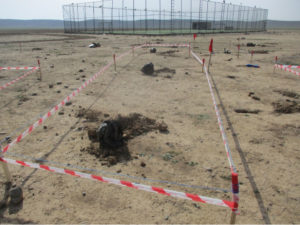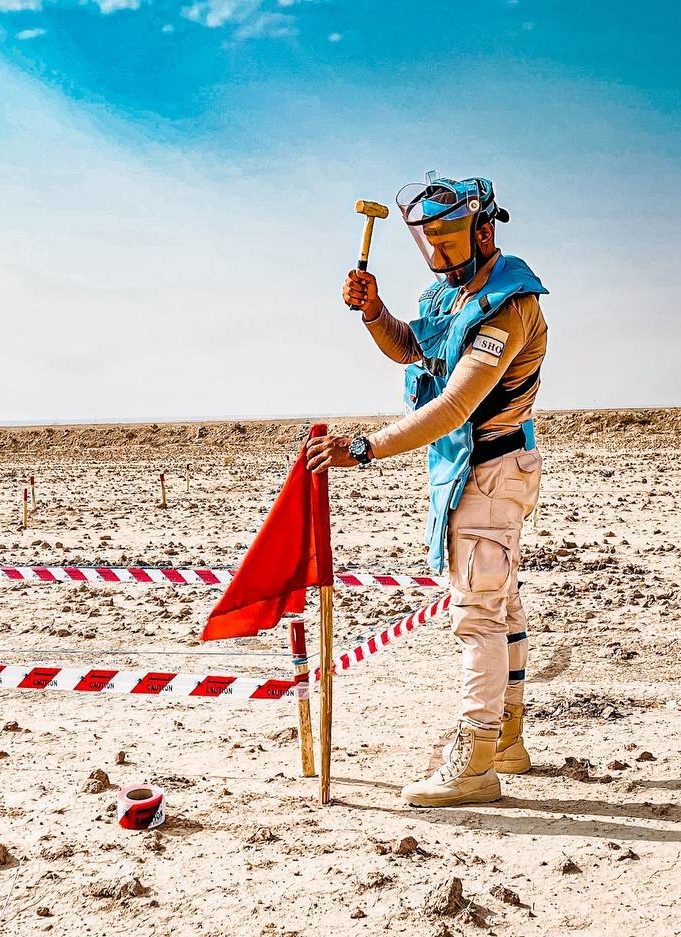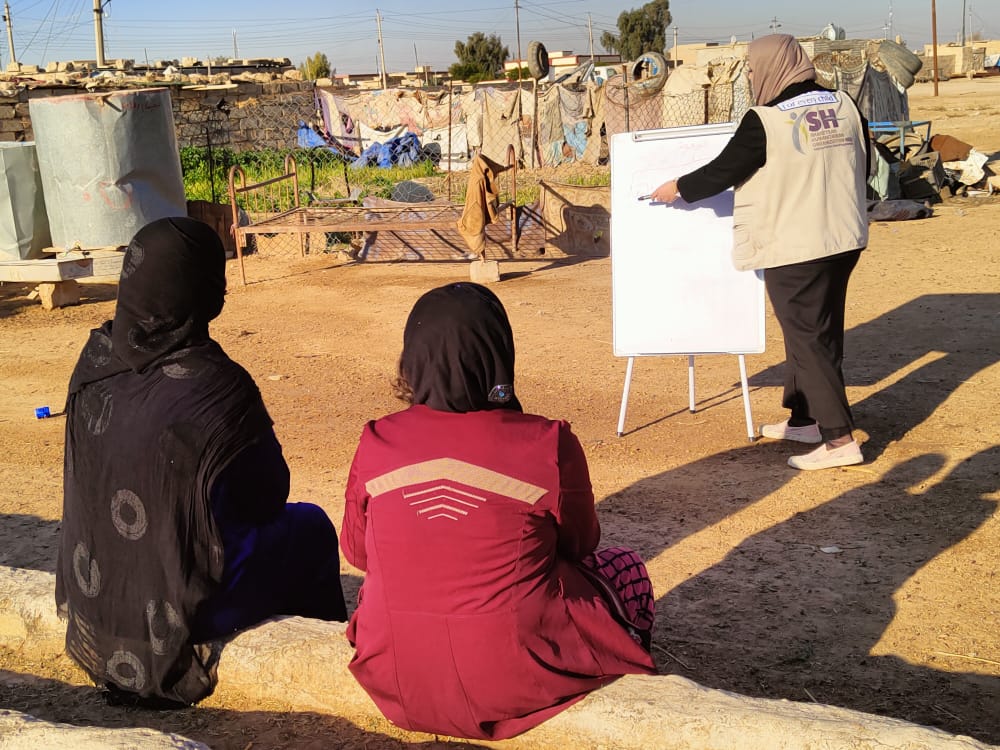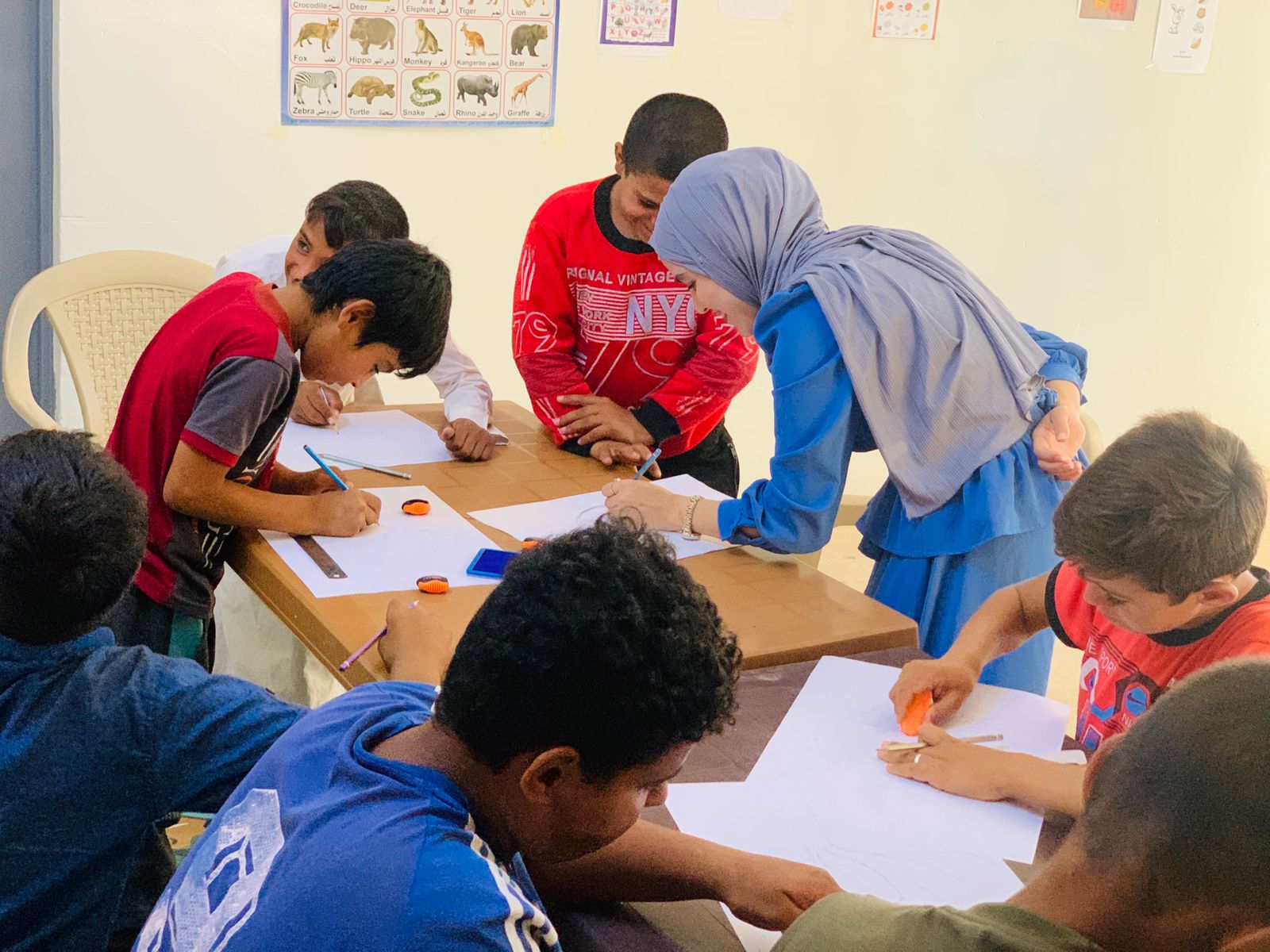Explosive hazard contamination in Iraq has been a persistent and devastating issue for decades, with multiple conflicts leaving behind a lethal legacy of landmines, unexploded ordnance (UXO), and improvised explosive devices (IEDs). These hazards not only pose a significant threat to the lives of civilians but also hamper economic growth, hinder reconstruction efforts, and impede the safe return of internally displaced persons (IDPs) to their homes.
The importance of mine action in Iraq cannot be overstated. It encompasses a wide range of activities, including risk education, clearance operations, and victim assistance, all aimed at mitigating the threat posed by explosive hazards and facilitating the country’s recovery. Effective mine action is crucial to ensuring the safety and well-being of communities, enabling sustainable development, and fostering long-term peace and stability.
Shareteah Humanitarian Organization (SHO) has played an instrumental role in humanitarian mine action since its inception. The organization began its operations in Explosive Ordnance Risk Education (EORE) in 2019, and later expanded into mine clearance in 2021. Thanks to capacity-building partnerships funded by the United Nations Office for Project Services (UNOPS), overseen by the United Nations Mine Action Service (UNMAS), and in collaboration with the Swiss Foundation for Mine Action (FSD), SHO has been able to make a tangible impact on the ground. Moreover, a valuable capacity-building partnership with HAMAP-Humanitaire, funded by the French Ministry of Europe and Foreign Affairs, has further bolstered SHO’s efforts in addressing explosive hazard contamination.
By working tirelessly to tackle explosive hazard contamination and its associated risks, SHO is contributing to the creation of a safer, more secure, and prosperous Iraq.
Historical Context of Explosive Hazard Contamination in Iraq
Overview of conflicts contributing to contamination
Iraq has faced a series of conflicts that have contributed to the proliferation of explosive hazards across the country. The Iran-Iraq War (1980-1988) saw the initial deployment of landmines along the border regions. Subsequent conflicts, including the Gulf War (1990-1991), the Iraq War (2003-2011), and the battle against the Islamic State (ISIL) (2014-2017), further exacerbated the problem, with various parties deploying mines, improvised explosive devices (IEDs), and unexploded ordnance (UXO) as part of their military strategies.
Types of explosive hazards prevalent in Iraq
Explosive hazards in Iraq come in various forms, posing a significant threat to both civilians and infrastructure. Landmines, both anti-personnel and anti-vehicle, can be found in many areas, particularly along border zones and former frontlines. Unexploded ordnance (UXO), including artillery shells, rockets, and grenades, also present a considerable risk, as they can be accidentally detonated when disturbed. Additionally, the widespread use of improvised explosive devices (IEDs) by non-state actors, particularly during the ISIL conflict, has left a lasting impact on the country, with these devices often targeting civilians and security forces.
Impact on communities and infrastructure
The presence of explosive hazards has had a profound effect on communities and infrastructure in Iraq. Landmines, UXO, and IEDs have caused numerous casualties, with civilians often bearing the brunt of these deadly devices. Moreover, the fear of encountering explosive hazards has restricted freedom of movement and limited access to vital resources such as water, healthcare, and education. Agricultural lands, which are often heavily contaminated, have been rendered unusable, severely affecting the livelihoods of local populations and contributing to food insecurity.
Infrastructure has also been significantly impacted, with explosive hazards hindering reconstruction and development efforts. Roads, bridges, schools, hospitals, and other essential facilities have been damaged or destroyed, exacerbating the challenges faced by communities attempting to rebuild in the aftermath of conflict.
Addressing the pervasive issue of explosive hazard contamination is vital for the long-term recovery and development of Iraq, and organizations such as Shareteah Humanitarian Organization play a crucial role in this process.

Evolution of Mine Action in Iraq
Early efforts to address explosive hazards
The efforts to address explosive hazards in Iraq began in the 1990s following the Gulf War, with limited clearance activities and mine risk education initiatives taking place. However, the scale of the problem was immense, and the available resources were insufficient to tackle the issue effectively. As conflicts continued, the need for a more comprehensive and coordinated approach to mine action became increasingly apparent.
Formation and role of national and international mine action organizations
In response to the growing need for mine action, national and international organizations began to emerge and collaborate to address the issue. The Iraqi Kurdistan Mine Action Agency (IKMAA) was established in 2004 to coordinate mine action efforts in the Kurdistan region. On a national level, the Directorate of Mine Action (DMA) was founded in 2008 to oversee mine action activities throughout Iraq.
International organizations, such as the United Nations Mine Action Service (UNMAS), have also played a significant role in supporting Iraq’s mine action efforts. UNMAS has provided technical assistance, capacity-building, and funding to bolster Iraq’s mine action capabilities. Other international non-governmental organizations (NGOs) have also contributed to demining, risk education, and victim assistance initiatives across the country.
Shareteah Humanitarian Organization as a key player in mine action
In 2019, Shareteah Humanitarian Organization (SHO) emerged as a national mine action organization, beginning its operations in Explosive Ordnance Risk Education (EORE). Thanks to capacity-building partnerships funded by UNOPS, overseen by UNMAS, and in partnership with FSD, SHO expanded its activities to include mine clearance in 2021. Additionally, a capacity-building partnership with HAMAP-Humanitaire, funded by the French Ministry of Europe and Foreign Affairs, has further strengthened SHO’s capabilities.
As a key player in humanitarian mine action in Iraq, SHO has focused on addressing the needs of the most vulnerable communities affected by explosive hazards. The organization’s efforts include clearance of contaminated areas, risk education, and support for survivors and their families. Through these activities, SHO is contributing to the ongoing process of rebuilding Iraq and improving the lives of its people.
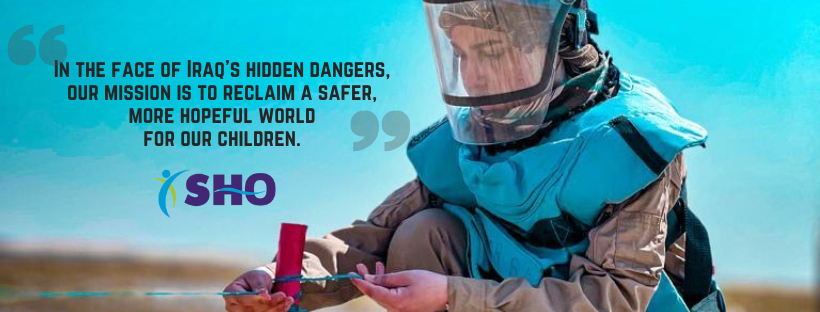
Challenges and Opportunities in Mine Action
Ongoing security concerns and their impact on mine action efforts
Despite the progress made in mine action in Iraq, ongoing security concerns continue to present challenges for organizations like Shareteah Humanitarian Organization (SHO) and their partners. The presence of armed groups, the risk of re-contamination, and access to contaminated areas can hinder mine clearance operations and pose safety risks to mine action personnel. Additionally, these security concerns can impact the successful implementation and sustainability of EORE initiatives. To overcome these challenges, mine action organizations must adopt adaptive and innovative strategies while working closely with local communities and authorities to ensure the safety and effectiveness of their operations.
Technological advancements and their role in mine clearance
Technological advancements have provided new opportunities for improving mine action efforts in Iraq. Innovations in detection and clearance equipment, such as ground-penetrating radar, unmanned aerial vehicles (UAVs), and advanced robotics, have enhanced the efficiency and safety of mine clearance operations. By embracing and investing in these cutting-edge technologies, mine action organizations like SHO can continue to improve their capabilities and make a greater impact in addressing explosive hazard contamination in the country.
Importance of collaboration between stakeholders
The complex nature of mine action in Iraq requires close collaboration between various stakeholders, including national and international mine action organizations, government agencies, affected communities, and donors. By working together, these stakeholders can pool their resources, share expertise, and develop comprehensive strategies to address the challenges posed by explosive hazard contamination. Collaboration is essential to ensure that mine action efforts are well-coordinated, targeted, and sustainable in the long term.
Through continued partnerships, capacity-building efforts, and the adoption of innovative technologies, mine action organizations like SHO can overcome the challenges they face and contribute significantly to the safety and wellbeing of communities affected by explosive hazards in Iraq.
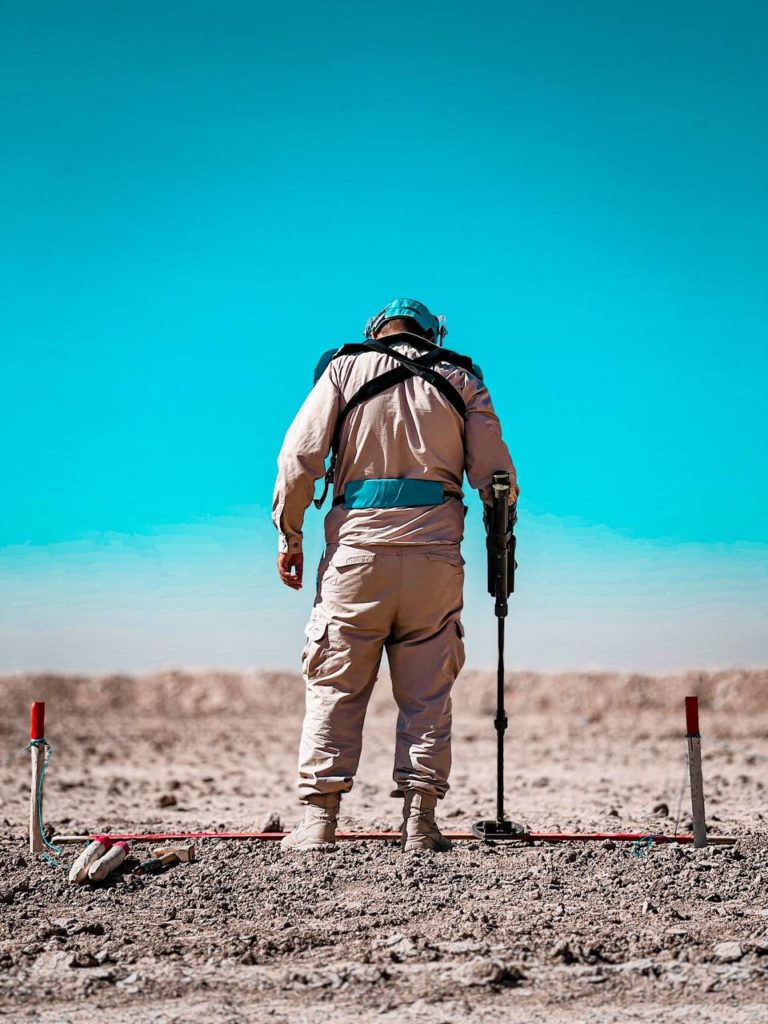
The Future of Mine Action in Iraq
Shareteah Humanitarian Organization’s vision and goals
As a key player in humanitarian mine action in Iraq, Shareteah Humanitarian Organization (SHO) is committed to a vision of a country free from the threat of explosive hazards. To achieve this vision, SHO aims to expand its mine clearance operations, enhance its Explosive Ordnance Risk Education (EORE) initiatives, and strengthen its capacity-building partnerships. By focusing on these strategic priorities, SHO will continue to make a significant impact in reducing the risks posed by explosive hazards, while promoting the safe and sustainable development of affected communities.
Long-term impact of successful mine action programs
The successful implementation of mine action programs in Iraq will have a profound long-term impact on the country and its people. By addressing the risks posed by explosive hazards, mine action organizations like SHO can help to create the conditions necessary for the safe return of internally displaced persons (IDPs) and refugees, and enable the reconstruction and rehabilitation of infrastructure and essential services. Furthermore, mine action programs contribute to the restoration of livelihoods, fostering economic growth and social cohesion in affected communities. Ultimately, these efforts can help to promote stability, security, and prosperity in Iraq.
Creating a safer and more prosperous Iraq
The future of mine action in Iraq hinges on the continued commitment and collaboration of stakeholders, including national and international mine action organizations, government agencies, affected communities, and donors. By working together, these stakeholders can build on the progress made thus far, and move closer to the goal of a safer and more prosperous Iraq, free from the threat of explosive hazards. In this context, organizations like SHO will continue to play a crucial role in driving forward mine action efforts, providing hope and a brighter future for the people of Iraq.
In conclusion, the history of explosive hazard contamination in Iraq has left a lasting impact on the country and its people. The efforts of mine action organizations, such as Shareteah Humanitarian Organization, have been instrumental in addressing the challenges posed by these hazards and paving the way for a safer and more prosperous future. Through capacity-building partnerships, EORE initiatives, and mine clearance operations, SHO and other stakeholders are working tirelessly to mitigate the risks posed by explosive hazards and promote the sustainable development of affected communities. As we look ahead, the ongoing collaboration and commitment of all stakeholders will be essential in achieving the ultimate goal of an Iraq free from the threat of explosive hazards, ensuring a brighter and more secure future for generations to come.


